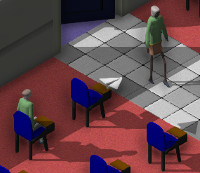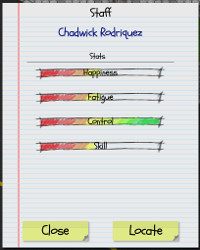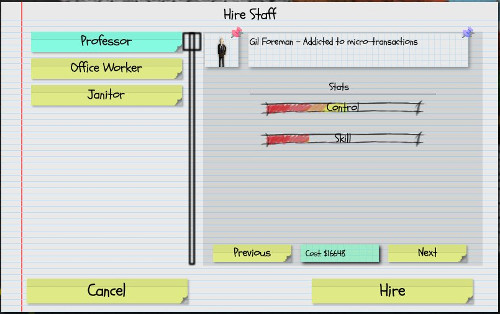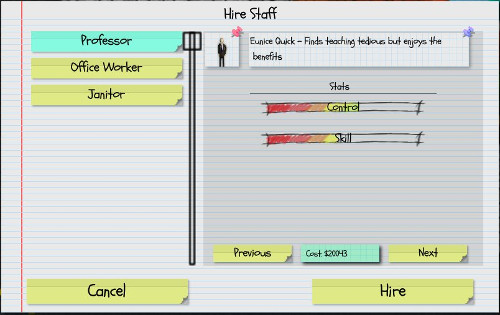
I didn’t make as much progress this month as I would have liked. A lot of time was spent on internals when I should really be focusing on gameplay so I can plan to release this. Hopefully the next month will be better.

Students can now randomly throw paper planes around the room during lessons. Currently this is just a visual effect but it may have other effects later.
This is part of a system that allows scripts to spawn, animate and control objects in a room completely clientside so no networking is required.

This was previously called feelings and was limited to students only. I have extended the system to cover staff as well with different entity types being able to have a different set of stats.
Currently the stats on staff don’t effect anything during lessons but this will change later.
These stats will effect the how well professors do their job when teaching e.g. control will effect how well a professor can handle large classes, skill will effect how well a professor teachs the class to its students.


A random selection of staff are now generated and displayed to the player on the hiring screen instead of giving them a random staff member when hiring. This includes randomized stats and a random description.
Rendering scaling should allow those with low end gpus to still manage to run the game. This reduces the rendering resolution of the game whilst not effect the user interface keeping the game playable.
One of the most messy parts of the game’s codebase was the entity delta encoding system. This system handled collecting ‘snapshots’ of the state of entities and serializing them into packet(s) that could be reconstructed on the other side to recreate the state. To optimize this it attempted to keep the packets small by only sending what changed, delta encoding. This involved a lot of comparing current and previous state and trying to work out how best to encode it. Like this
if ne.target.facing != oe.target.facing {
let _ = entity_data.write_bool(true);
if let Some(facing) = ne.target.facing {
let _ = entity_data.write_bool(true);
let _ = entity_data.write_f32(facing);
} else {
let _ = entity_data.write_bool(false);
}
} else {
let _ = entity_data.write_bool(false);
}
I realized a lot of this could be handled for me by a derive macro and set out to write one. And the end result was replacing about 200 lines of that with
let _ = ne.encode(Some(oe), &mut entity_data);
and not having to worry about the reading falling out of sync with the writing.
#[derive(DeltaEncode)]
struct EntitySnapshot {
info: EntityInfo,
#[delta_default]
entity: ecs::Entity,
owner: Option<player::Id>,
target: ETarget,
selected: Option<player::Id>,
room: Option<ERoom>,
data: Option<EntityData>,
emotes: Vec<EEmote>,
tints: Vec<EColor>,
}
#[derive(DeltaEncode, PartialEq, Clone)]
#[delta_complete]
struct EntityInfo {
key: Arc<assets::ResourceKey<'static>>,
variant: u8,
name: EName,
}
For the most part only the DeltaEncode derive is needed to generate the required code but attributes can be used to optimize/handle different cases. delta_complete for example will only send the contents of the struct if its not equal to its previous and it’ll send the whole contents in that case instead of a delta. In the case where nothing has changed a single bit is used to mark it. delta_default just fills the field with its default value instead of (de)serializing it. delta_bits can be used on integers to set the number of bits used to serialize the value.
In the case of position of the entity we can use the attributes to optimize it even more by knowing the limits of the values.
#[derive(Debug, Clone, DeltaEncode, PartialEq)]
struct ETarget {
#[delta_fixed]
#[delta_subbits = "4:5,6:5,10:5,16:5,-1:-1"]
time: f32,
#[delta_fixed]
#[delta_diff]
#[delta_subbits = "4:5,6:5,10:5,16:5,-1:-1"]
x: f32,
#[delta_fixed]
#[delta_diff]
#[delta_subbits = "4:5,6:5,10:5,16:5,-1:-1"]
z: f32,
facing: Option<Angle>,
}
delta_fixed causes the floating point number to be encoded as a fixed point number which can allow for other attributes like delta_subbits and delta_diff to function. delta_subbits will go through through the list in order (where the values are <intbits>:<fractbits>) and try and encode the value in the least number of bits possible. delta_diff will encode the difference from the last value instead of encoding the full number, when combined with delta_subbits this can end up with large savings when the entity only moves slightly.
The code for the derive macro is horrible currently but it works. I’m not really sure how to handle code generation in a nice way but i’d like to clean it up so I could release this as a crate at some point.
filter to Option on nightly actually broke the build due to a filter method I had already added via a extension trait. I had to rename my method to get the build working again.I’ve haven’t been streaming my work on twitch here lately but sometimes I will pop up and stream for a bit. Feel free to stop by and watch if i’m streaming.
I’ve opened a subreddit for the game as per someones suggestion. Its empty currently but hopefully that’ll change once I get some time to put some work into it. Here